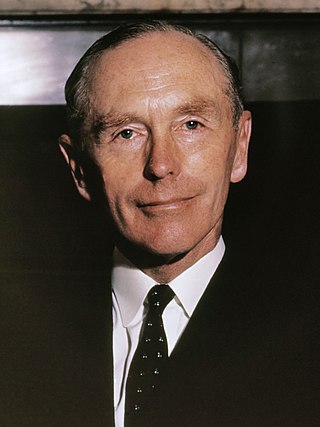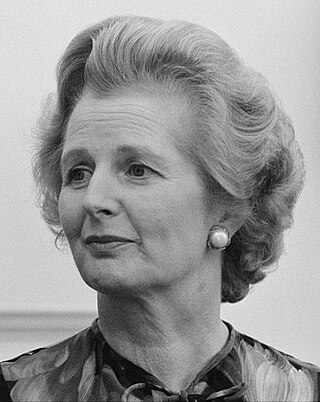Related Research Articles

Sir Edward Richard George Heath, often known as Ted Heath, was a British politician who served as Prime Minister of the United Kingdom from 1970 to 1974 and Leader of the Conservative Party from 1965 to 1975. Heath also served for 51 years as a Member of Parliament from 1950 to 2001. Outside politics, Heath was a yachtsman, a musician, and an author.

Leonard James Callaghan, Baron Callaghan of Cardiff,, commonly known as Jim Callaghan, was a British statesman and politician who served as Prime Minister of the United Kingdom from 1976 to 1979 and Leader of the Labour Party from 1976 to 1980. Callaghan is the only person to have held all four Great Offices of State, having served as Chancellor of the Exchequer from 1964 to 1967, Home Secretary from 1967 to 1970 and Foreign Secretary from 1974 to 1976. He was a Member of Parliament (MP) from 1945 to 1987.

His Majesty's Home Civil Service, also known as His Majesty's Civil Service, the Home Civil Service, or colloquially as the Civil Service is the permanent bureaucracy or secretariat of Crown employees that supports His Majesty's Government, which is led by a cabinet of ministers chosen by the Prime Minister of the United Kingdom of Great Britain and Northern Ireland, as well as two of the three devolved administrations: the Scottish Government and the Welsh Government, but not the Northern Ireland Executive.

Maurice Harold Macmillan, 1st Earl of Stockton, was a British Conservative statesman and politician who was Prime Minister of the United Kingdom from 1957 to 1963. Caricatured as "Supermac", he was known for his pragmatism, wit and unflappability.

Alexander Frederick Douglas-Home, Baron Home of the Hirsel,, styled as Lord Dunglass between 1918 and 1951 and being The 14th Earl of Home from 1951 until 1963, was a British Conservative politician who served as Prime Minister of the United Kingdom from 1963 to 1964. He is notable for being the last Prime Minister to hold office while being a member of the House of Lords, before renouncing his peerage and taking up a seat in the House of Commons for the remainder of his premiership. His reputation, however, rests more on his two stints as Foreign Secretary than on his brief premiership.

New Labour was a period in the history of the British Labour Party from the mid to late 1990s until 2010 under the leadership of Tony Blair and Gordon Brown. The name dates from a conference slogan first used by the party in 1994, later seen in a draft manifesto which was published in 1996 and titled New Labour, New Life for Britain. It was presented as the brand of a newly reformed party that had altered Clause IV and endorsed market economics. The branding was extensively used while the party was in government between 1997 and 2010. New Labour was influenced by the political thinking of Anthony Crosland and the leadership of Blair and Brown as well as Peter Mandelson and Alastair Campbell's media campaigning. The political philosophy of New Labour was influenced by the party's development of Anthony Giddens' Third Way which attempted to provide a synthesis between capitalism and socialism. The party emphasised the importance of social justice, rather than equality, emphasising the need for equality of opportunity and believed in the use of markets to deliver economic efficiency and social justice.

Reginald Maudling was a British politician who served as Chancellor of the Exchequer from 1962 to 1964 and as Home Secretary from 1970 to 1972. From 1955 until the late 1960s, he was spoken of as a prospective Conservative leader, and he was twice seriously considered for the post; he was Edward Heath's chief rival in 1965. He also held directorships in several British financial firms.

Richard Austen Butler, Baron Butler of Saffron Walden,, also known as R. A. Butler and familiarly known from his initials as Rab, was a prominent British Conservative Party politician. His obituary in The Times called him "the creator of the modern educational system, the key-figure in the revival of post-war Conservatism, arguably the most successful chancellor since the war and unquestionably a Home Secretary of reforming zeal". He was one of his party's leaders in promoting the post-war consensus through which the major parties largely agreed on the main points of domestic policy until the 1970s; it is sometimes known as "Butskellism" from a fusion of his name with that of his Labour counterpart, Hugh Gaitskell.
The Secretary of State for the Environment was a UK cabinet position, responsible for the Department of the Environment (DoE). This was created by Edward Heath as a combination of the Ministry of Housing and Local Government, the Ministry of Transport and the Ministry of Public Building and Works on 15 October 1970. Thus it managed a mixed portfolio of issues: housing and planning, local government, public buildings, environmental protection and, initially, transport – James Callaghan gave transport its own department again in 1976. It has been asserted that during the Thatcher government the DoE led the drive towards centralism, and the undermining of local government. Particularly, the concept of 'inner cities policy', often involving centrally negotiated public-private partnerships and centrally appointed development corporations, which moved control of many urban areas to the centre, and away from their, often left-wing, local authorities. The department was based in Marsham Towers, three separate tower blocks built for the separate pre-merger ministries, in Westminster.

The Asquith coalition ministry was the Government of the United Kingdom under the Liberal Prime Minister H. H. Asquith from May 1915 to December 1916. It was formed as a multi-party war-time coalition nine months after the beginning of the First World War but collapsed when the Conservative Party withdrew.
A private secretary (PS) is a civil servant in a governmental department or ministry, responsible to a secretary of state or minister; or a public servant in a royal household, responsible to a member of the royal family.

The Conservative government of the United Kingdom that began in 1957 and ended in 1964 consisted of three ministries: the first Macmillan ministry, second Macmillan ministry, and then the Douglas-Home ministry. They were respectively led by Harold Macmillan and Sir Alec Douglas-Home, who were appointed by Queen Elizabeth II.
The Ministry of Technology was a department of the government of the United Kingdom, sometimes abbreviated as "MinTech". The Ministry of Technology was established by the incoming government of Harold Wilson in October 1964 as part of Wilson's ambition to modernise the state for what he perceived to be the needs of the 1960s. The pledge was included in the Labour Party's 1964 general election manifesto: "A Labour Government will .. [set] up a Ministry of Technology to guide and stimulate a major national effort to bring advanced technology and new processes into the industry."

Edward Heath of the Conservative Party formed the Heath ministry and was appointed Prime Minister of the United Kingdom by Queen Elizabeth II on 19 June 1970, following the 18 June general election. Heath's ministry ended after the February 1974 general election, which produced a hung parliament, leading to the formation of a minority government by Harold Wilson of the Labour Party.

Richard Lawrence Leonard was a British writer, journalist and Labour politician who served as Member of Parliament (MP) for Romford from 1970 to 1974. He was a pro-European social democrat and had been a supporter of the late Labour foreign secretary Anthony Crosland, who championed Gaitskellism.
The Central Policy Review Staff (CPRS), nicknamed the "Think-Tank", was an independent unit within the Cabinet Office of the United Kingdom tasked with developing long term strategy and co-ordinating policy across government departments. It was established by Edward Heath in February 1971 but was later disbanded by Margaret Thatcher following the 1983 general election.

Margaret Thatcher became the first female Leader of the Conservative Party and Leader of the Opposition after winning the 1975 leadership election, the first Conservative leadership election where the post was not vacant. A rule change to enable the election was largely prompted by dissatisfaction with the incumbent leader, Edward Heath, who had lost three of four general elections as leader, including two in 1974. After announcing her first Shadow Cabinet in February 1975, she reshuffled it twice: in January and November 1976. Minor subsequent changes were necessary to respond to various circumstances. Thatcher's Shadow Cabinet ceased to exist upon her becoming Prime Minister following the 1979 general election.

When Britain emerged victorious from the Second World War, the Labour Party under Clement Attlee came to power and created a comprehensive welfare state, with the establishment of the National Health Service giving free healthcare to all British citizens, and other reforms to benefits. The Bank of England, railways, heavy industry, and coal mining were all nationalised. The most controversial issue was nationalisation of steel, which was profitable unlike the others. Economic recovery was slow, housing was in short supply, bread was rationed along with many necessities in short supply. It was an "age of austerity". American loans and Marshall Plan grants kept the economy afloat. India, Pakistan, Burma and Ceylon gained independence. Britain was a strong anti-Soviet factor in the Cold War and helped found NATO in 1949. Many historians describe this era as the "post-war consensus" emphasizing how both the Labour and Conservative parties until the 1970s tolerated or encouraged nationalisation, strong trade unions, heavy regulation, high taxes, and a generous welfare state.
Sir Frederick Arthur BishopCBCVO, sometimes called Freddie Bishop, was a British civil servant who served as Principal Private Secretary to the Prime Minister of the United Kingdom, 1956–59.
Arthur Norman Michael HallsMBETD, also known as Michael Halls, was a British civil servant who served as Principal Private Secretary to the Prime Minister of the United Kingdom, Harold Wilson, 1966–70.
References
- ↑ Davis, Jon (2007-12-05). Prime Ministers and Whitehall 1960-74. A&C Black. p. 99. ISBN 978-1-84725-169-5.
- ↑ Chapter 6 of Regional Devolution and Social Policy (1975), edited by Edward Craven. For commentary on this paper, see (1976) 44 Town and Country Planning 551; "Book Reviews" (1976) 54 Public Administration 229 and 230; (1976) Geography 182; (1976) British Book News 108; and "Putting the centralisers in their place" in "Books" (1976) 84 Municipal and Public Services Journal 41 (9 January 1976).
- ↑ Chapter 1 of The Corporate State, Reality Or Myth?.
- ↑ For commentary on this paper, see (1982) 11 Teaching Politics 305, 306 & 310; and Bulmer (ed), Social Research and Royal Commissions, 1980, p 33.
- ↑ Chapter 8 of Fifty Years of Political & Economic Planning
- ↑ Conversations on Policy. Policy Studies Institute, Discussion Paper No 7. May 1984. For commentary on this book, see (1984) 11 Economic titles/abstracts 16.
Sources
- Rubinstein, Jolles, and Rubinstein (eds). "Isserlis, Alexander Reginald". The Palgrave Dictionary of Anglo-Jewish History. Palgrave Macmillan. 2011. Pages 460 and 461.
- The Times. 24 April 1970.
- The Times. 10 July 1970.
- The Times. 2 September 1970.
- Jewish Chronicle. 1 May 1970.
- Peter Paterson, "Why not a spoils system?" (1970) 225 The Spectator 32 (18 July 1970)
- "People" (1970) 38 Town and Country Planning 259
- Andrew Holt and Warren Dockter (eds). Private Secretaries to the Prime Minister. Routledge. 2017. Pages PT323, PT326 and passim.
- John Davis. Prime Ministers and Whitehall 1960-74. Hambledon Continuum. 2007. Page 76.
- Kevin Theakston (ed). Bureaucrats and Leadership. Macmillan Press. 2000. Page 83.
- Peter Hennessy. The Prime Minister: The Office and Its Holders Since 1945. Palgrave, for St Martins Press. 2001. Page 340.
- Stuart Ball and Anthony Seldon. The Heath Government, 1970-1974: A Reappraisal. Addison Wesley Longman. 1996. Routledge. 2013. Pages 62, 75 and 85.
- Kellner and Crowther-Hunt. The Civil Servants. Macdonald. 1980. Page 77.
- State of Emergency: The Way We Were: Britain, 1970-1974. Allen Lane. 2010. Page 53. Penguin Books. 2011. PT80.
- Griffith (ed). From Policy to Administration. PT12, PT24 and PT25.